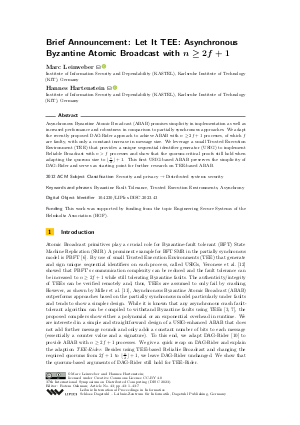Brief Announcement: Let It TEE: Asynchronous Byzantine Atomic Broadcast with n ≥ 2f+1
Authors
Marc Leinweber  ,
Hannes Hartenstein
,
Hannes Hartenstein 
-
Part of:
Volume:
37th International Symposium on Distributed Computing (DISC 2023)
Part of: Series: Leibniz International Proceedings in Informatics (LIPIcs)
Part of: Conference: International Symposium on Distributed Computing (DISC) - License:
 Creative Commons Attribution 4.0 International license
Creative Commons Attribution 4.0 International license
- Publication Date: 2023-10-05
File

PDF
LIPIcs.DISC.2023.43.pdf
- Filesize: 0.66 MB
- 7 pages
Document Identifiers
Subject Classification
ACM Subject Classification
- Security and privacy → Distributed systems security
Keywords
- Byzantine Fault Tolerance
- Trusted Execution Environments
- Asynchrony
Metrics
- Access Statistics
-
Total Accesses (updated on a weekly basis)
0PDF Downloads0Metadata Views
Abstract
Asynchronous Byzantine Atomic Broadcast (ABAB) promises simplicity in implementation as well as increased performance and robustness in comparison to partially synchronous approaches. We adapt the recently proposed DAG-Rider approach to achieve ABAB with n ≥ 2f+1 processes, of which f are faulty, with only a constant increase in message size. We leverage a small Trusted Execution Environment (TEE) that provides a unique sequential identifier generator (USIG) to implement Reliable Broadcast with n > f processes and show that the quorum-critical proofs still hold when adapting the quorum size to ⌊ n/2 ⌋ + 1. This first USIG-based ABAB preserves the simplicity of DAG-Rider and serves as starting point for further research on TEE-based ABAB.
Cite As Get BibTex
Marc Leinweber and Hannes Hartenstein. Brief Announcement: Let It TEE: Asynchronous Byzantine Atomic Broadcast with n ≥ 2f+1. In 37th International Symposium on Distributed Computing (DISC 2023). Leibniz International Proceedings in Informatics (LIPIcs), Volume 281, pp. 43:1-43:7, Schloss Dagstuhl – Leibniz-Zentrum für Informatik (2023)
https://doi.org/10.4230/LIPIcs.DISC.2023.43
BibTex
@InProceedings{leinweber_et_al:LIPIcs.DISC.2023.43,
author = {Leinweber, Marc and Hartenstein, Hannes},
title = {{Brief Announcement: Let It TEE: Asynchronous Byzantine Atomic Broadcast with n ≥ 2f+1}},
booktitle = {37th International Symposium on Distributed Computing (DISC 2023)},
pages = {43:1--43:7},
series = {Leibniz International Proceedings in Informatics (LIPIcs)},
ISBN = {978-3-95977-301-0},
ISSN = {1868-8969},
year = {2023},
volume = {281},
editor = {Oshman, Rotem},
publisher = {Schloss Dagstuhl -- Leibniz-Zentrum f{\"u}r Informatik},
address = {Dagstuhl, Germany},
URL = {https://drops.dagstuhl.de/entities/document/10.4230/LIPIcs.DISC.2023.43},
URN = {urn:nbn:de:0030-drops-191694},
doi = {10.4230/LIPIcs.DISC.2023.43},
annote = {Keywords: Byzantine Fault Tolerance, Trusted Execution Environments, Asynchrony}
}
Author Details
- Institute of Information Security and Dependability (KASTEL), Karlsruhe Institute of Technology (KIT), Germany
Funding
This work was supported by funding from the topic Engineering Secure Systems of the Helmholtz Association (HGF).
References
- Ittai Abraham, Marcos Kawazoe Aguilera, and Dahlia Malkhi. Fast asynchronous consensus with optimal resilience. In Nancy A. Lynch and Alexander A. Shvartsman, editors, Distributed Computing, volume 6343 of Lecture Notes in Computer Science, pages 4-19. Springer, 2010. URL: https://doi.org/10.1007/978-3-642-15763-9_3.
- Hagit Attiya and Jennifer L. Welch. Distributed computing - fundamentals, simulations, and advanced topics (2. ed.). Wiley, 2004. URL: https://doi.org/10.1002/0471478210.
- Naama Ben-David, Benjamin Y. Chan, and Elaine Shi. Revisiting the power of non-equivocation in distributed protocols. In Alessia Milani and Philipp Woelfel, editors, PODC '22: ACM Symposium on Principles of Distributed Computing, Salerno, Italy, July 25 - 29, 2022, pages 450-459. ACM, 2022. URL: https://doi.org/10.1145/3519270.3538427.
- Alexandra Boldyreva. Threshold signatures, multisignatures and blind signatures based on the gap-diffie-hellman-group signature scheme. In Yvo Desmedt, editor, Public Key Cryptography - PKC 2003, volume 2567 of Lecture Notes in Computer Science, pages 31-46. Springer, 2003. URL: https://doi.org/10.1007/3-540-36288-6_3.
- Christian Cachin, Klaus Kursawe, and Victor Shoup. Random oracles in constantinople: Practical asynchronous byzantine agreement using cryptography. J. Cryptol., 18(3):219-246, 2005. URL: https://doi.org/10.1007/s00145-005-0318-0.
- Miguel Castro and Barbara Liskov. Practical byzantine fault tolerance and proactive recovery. ACM Trans. Comput. Syst., 20(4):398-461, 2002. URL: https://doi.org/10.1145/571637.571640.
- Allen Clement, Flavio Junqueira, Aniket Kate, and Rodrigo Rodrigues. On the (limited) power of non-equivocation. In Darek Kowalski and Alessandro Panconesi, editors, ACM Symposium on Principles of Distributed Computing, PODC '12, Funchal, Madeira, Portugal, July 16-18, 2012, pages 301-308. ACM, 2012. URL: https://doi.org/10.1145/2332432.2332490.
- Miguel Correia, Giuliana Santos Veronese, and Lau Cheuk Lung. Asynchronous byzantine consensus with 2f+1 processes. In Sung Y. Shin, Sascha Ossowski, Michael Schumacher, Mathew J. Palakal, and Chih-Cheng Hung, editors, Proceedings of the 2010 ACM Symposium on Applied Computing (SAC), Sierre, Switzerland, March 22-26, 2010, pages 475-480. ACM, 2010. URL: https://doi.org/10.1145/1774088.1774187.
- George Danezis, Lefteris Kokoris-Kogias, Alberto Sonnino, and Alexander Spiegelman. Narwhal and Tusk: a DAG-based mempool and efficient BFT consensus. In Yérom-David Bromberg, Anne-Marie Kermarrec, and Christos Kozyrakis, editors, EuroSys '22: Seventeenth European Conference on Computer Systems, Rennes, France, April 5 - 8, 2022, pages 34-50. ACM, 2022. URL: https://doi.org/10.1145/3492321.3519594.
- Idit Keidar, Eleftherios Kokoris-Kogias, Oded Naor, and Alexander Spiegelman. All you need is DAG. In Avery Miller, Keren Censor-Hillel, and Janne H. Korhonen, editors, PODC '21: ACM Symposium on Principles of Distributed Computing, Virtual Event, Italy, July 26-30, 2021, pages 165-175. ACM, 2021. URL: https://doi.org/10.1145/3465084.3467905.
- Andrew Miller, Yu Xia, Kyle Croman, Elaine Shi, and Dawn Song. The honey badger of BFT protocols. In Edgar R. Weippl, Stefan Katzenbeisser, Christopher Kruegel, Andrew C. Myers, and Shai Halevi, editors, Proc. 2016 ACM SIGSAC Conf. on Computer and Communications Security, Vienna, Austria, 2016, pages 31-42. ACM, 2016. URL: https://doi.org/10.1145/2976749.2978399.
- Giuliana Santos Veronese, Miguel Correia, Alysson Neves Bessani, Lau Cheuk Lung, and Paulo Veríssimo. Efficient byzantine fault-tolerance. IEEE Trans. Computers, 62(1):16-30, 2013. URL: https://doi.org/10.1109/TC.2011.221.
